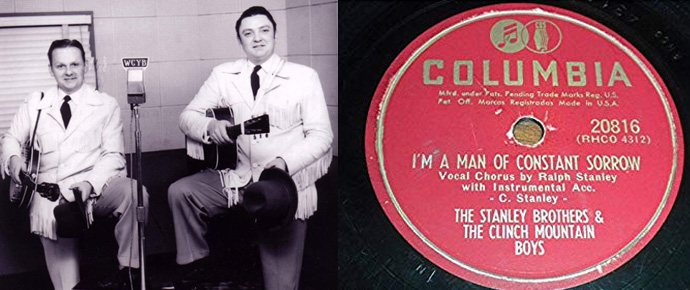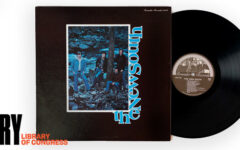
The Stanley Brothers’ 1951 Columbia release of the classic song, I’m A Man of Constant Sorrow, is among the 2020 Grammy Hall of Fame Inductees.
The Stanley Brothers, Carter (guitar) and Ralph (banjo), along with the Clinch Mountain Boys – Pee Wee Lambert (mandolin), Lester Woodie (fiddle) and Ernie Newton (bass) – recorded the song during their third session for Columbia Records on November 3, 1950, at the Castle Studio, in the Tulane Hotel, Nashville. It features just one lonesome voice, that of Ralph Stanley.
Jeanie Stanley, the youngest of Carter’s five children and a strong advocate for the Stanley Brothers’ induction into the Country Music Hall of Fame, shares this reaction to the news …
“On behalf of the family of Carter Stanley, we are grateful and humbled by this tremendous honor.”
Ralph Stanley recalled this about the song in a 2009 interview with the Diane Rehm Show …
“Man of Constant Sorrow is probably two or three hundred years old. But the first time I heard it when I was, y’know, like a small boy, my daddy – my father – he had some of the words to it, and I heard him sing it, and we – my brother and me – we put a few more words to it, and brought it back in existence. I guess if it hadn’t been for that it’d have been gone forever. I’m proud to be the one that brought that song back, because I think it’s wonderful.”
The Stanley Brothers & the Clinch Mountain Boys, I’m A Man of Constant Sorrow …
Other Grammy inductees this year include recordings by the Chuck Wagon Gang – I’ll Fly Away (Columbia, 1949); Patsy Cline – Walkin’ After Midnight (Decca, 1957); Bo Diddley – I’m A Man (Checker, 1955); Skip James – Devil Got My Woman (Paramount, 1931); James P. Johnson – Carolina Shout (OKeh, 1921); Willie Nelson and Merle Haggard – Pancho And Lefty (Epic, 1982); Blind Alfred Reed – How Can A Poor Man Stand Such Times and Live (Victor, 1930); and The Surfaris – Wipe Out (Dot, 1963).
Eligible recipients will receive an official certificate from the Recording Academy.
Historical footnote –
The song was first published in 1913 by the blind folk singer Richard Daniel (Dick) Burnett, from Monticello, Kentucky, who sang it as Farewell Song. It is included in a booklet of six tunes called Songs Sung by R.D. Burnett – The Blind Man.
The phrase “six long years” most likely alludes to Burnett being blinded by a gunshot explosion in his face while fighting off a mugger in 1907, judging from the line in Wandering Boy, “Oh, six long years I’ve been blind, friends.”
It has been suggested that he adapted it from a Baptist hymn called Wandering Boy, while hymnologist John Garst found a connection with the 1807 hymn Christ Suffering, which included the lines, “He was a man of constant sorrow, he went a mourner all his days.”
Burnett recorded his version for Columbia Records in 1927, but the label refused to release it and even destroyed the master. Burnett’s friend and fellow Kentuckian, Emry Arthur, made the first commercial release the following year using the title Man of Constant Sorrow.
Cecil Sharp, the founding father of the folk-song revival in England, collected the song in 1918 and published it as In Old Virginny.
There have been many other recordings of the song before and after the one by the Stanley Brothers, including a few that were sung from a female perspective.
The most famous version of I’m A Man of Constant Sorrow is that by the fictitious Soggy Bottom Boys as part of the Coen Brothers’ 2000 film, O Brother, Where Art Thou? It launched this mountain ballad into mainstream consciousness.
Singing lead on the recording in the role played by actor George Clooney was Dan Tyminski, with backing vocals from Harley Allen and Pat Enright. Also playing on the track were Jerry Douglas, Barry Bales, and Ron Block.







